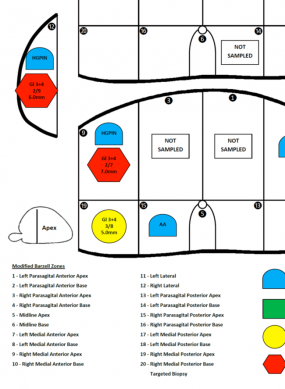Prostate Mapping
Without doubt the current way we diagnose or rule out prostate cancer is flawed. By using a more detailed biopsy approach using a template with samples being taken via the trans-perineal route (rather than conventional trans-rectal), and also with the help of sophisticated imaging using MRI, we can be much more accurate in our assessment of a man with suspected prostate cancer. Indeed, these investigations are increasingly used now to determine the need for treatment in a man already with a diagnosis of prostate cancer uncertain about whether treatment is actually required or if it safe to continue monitoring.
Template guided prostate biopsies or template prostate mapping (TPM) is performed as a day-case under a short general anaesthetic the procedure taking 30-40 minutes. There can be some bruising afterwards but the risk of infection is greatly reduced using this approach. The traditional trans-rectal approach (TRUS biopsy) is a bit ‘hit and miss’ and can result in a urinary infection in 3-4% despite antibiotics. Sometimes this can be serious.
There have been significant advances in the field of prostate imaging and Urology Partners are at the fore-front of this with participation as trial centres in their respective NHS institutions in the PROMIS trial which is a large study which aims to explore the role of MRI in the diagnosis of prostate cancer before any biopsies are taken. By using multi-parametric MRI we can interrogate the prostate in detail looking for areas of increased uptake of contrast (dye) and examining the movement of molecules during the scan. This requires careful interpretation by experienced Radiologists but can detect very small areas of cancer.
For more information please visit www.prostatemapping.com
Template guided prostate biopsies or template prostate mapping (TPM) is performed as a day-case under a short general anaesthetic the procedure taking 30-40 minutes. There can be some bruising afterwards but the risk of infection is greatly reduced using this approach. The traditional trans-rectal approach (TRUS biopsy) is a bit ‘hit and miss’ and can result in a urinary infection in 3-4% despite antibiotics. Sometimes this can be serious.
By using these 2 techniques we can make an informed choice about what is required if cancer is present, and if there is no cancer evident following these investigations then be reassured that nothing important has been missed.
There have been significant advances in the field of prostate imaging and Urology Partners are at the fore-front of this with participation as trial centres in their respective NHS institutions in the PROMIS trial which is a large study which aims to explore the role of MRI in the diagnosis of prostate cancer before any biopsies are taken. By using multi-parametric MRI we can interrogate the prostate in detail looking for areas of increased uptake of contrast (dye) and examining the movement of molecules during the scan. This requires careful interpretation by experienced Radiologists but can detect very small areas of cancer.
For more information please visit www.prostatemapping.com

